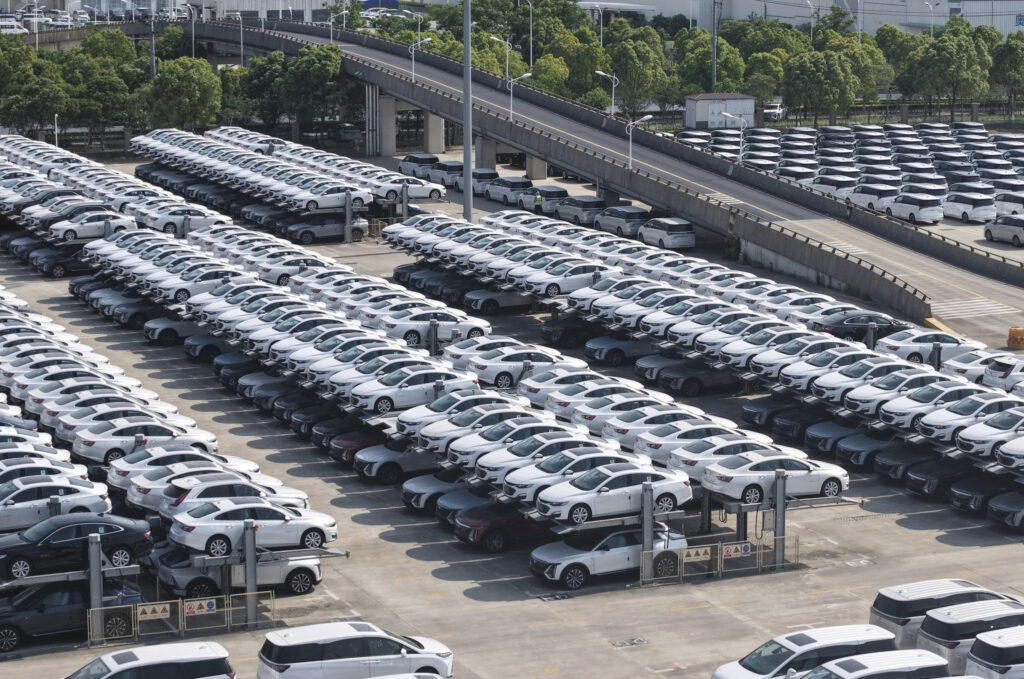General Motors (GM) has stopped shipping vehicles to China from the United States.
According to Reuters, GM informed employees and dealers for its China export business of the decision late last week. The move comes amid continuing trade tensions, despite a recent 90-day pause that reduced reciprocal tariffs between the two countries.
Newsweek reached out to GM via email on Monday for comment.
The Context
This decision comes during a challenging period for GM in China. In December, GM announced it would absorb more than $5 billion in charges during the fourth quarter due to the poor performance of its Chinese joint ventures. The company reported writing down the value of its equity stake by $2.6 billion to $2.9 billion and incurring $2.7 billion in restructuring charges.
GM reported a $347 million loss from these ventures from January to September 2024, compared with a $353 million profit during the same period in 2023. China has become an increasingly difficult market for foreign automakers as domestic competitors, including BYD, have gained market share by improving quality and reducing costs, often with government subsidies.
Why It Matters
This development reflects how automakers are navigating the turbulent trade environment that began when the White House placed a 25 percent tariff on auto imports in April. President Donald Trump’s administration justified these measures as necessary to spur domestic manufacturing and protect American industries.
“The U.S. automobile industry has been undermined by excessive imports threatening America’s domestic industrial base and supply chains,” the White House said last month.
Trump later announced executive orders to ease some of the 25 percent tariffs on automobiles and auto parts, while leaving broader tariff threats in place.
GM’s decision follows Ford Motor’s similar move in April to halt exports to China, signaling how major American automakers are adjusting operations in response to unpredictable economic conditions and retaliatory tariffs that have made exports increasingly challenging.
What To Know
GM imported vehicles to China through its Durant Guild premium import business, which represented less than 0.1 percent of its China sales volume. While relatively minor in scale, this decision comes amid broader challenges for GM in the Chinese market.
The recent agreement between China and the U.S. pauses reciprocal tariffs for 90 days, reducing rates by 115 percent. This temporarily lowers tariffs on Chinese goods to 30 percent and those on U.S. goods to 10 percent, providing short-term relief while negotiators work toward a more comprehensive solution.
Before this agreement, goods imported by China from the United States faced tariffs exceeding 100 percent, making vehicle exports particularly challenging.
What People Are Saying
A GM spokesperson said in a statement: “Due to significant changes to economic conditions, we have decided to restructure The Durant Guild and correspondingly optimize GM China’s operations.”
In a shareholder letter in May, GM CEO Mary Barra said: “As you know, there are ongoing discussions with key trade partners that may also have an impact.”
She added: “We will continue to be nimble and disciplined and update you as we know more.”
GM Chief Financial Officer Paul Jacobson told reporters in April: “We believe the future impact of tariffs could be significant.”
A spokesperson for the Chinese commerce ministry said last week, per state Xinhua News Agency: “It is hoped that the U.S. side will continue to work with China on the basis of this meeting, thoroughly correct the erroneous practice of unilateral tax increases, continuously strengthen mutually beneficial cooperation, maintain the healthy, stable and sustainable development of China-U.S. economic and trade relations, and jointly inject more certainty and stability into the world economy.”
Trump has defended the revised policy shift as a necessary step toward reshoring manufacturing: “We’re putting America first,” he said at a news conference in early May.
What Happens Next
As GM restructures its operations in China, attention will focus on how the automaker navigates ongoing challenges in what was once a dependable market.
Read the full article here
